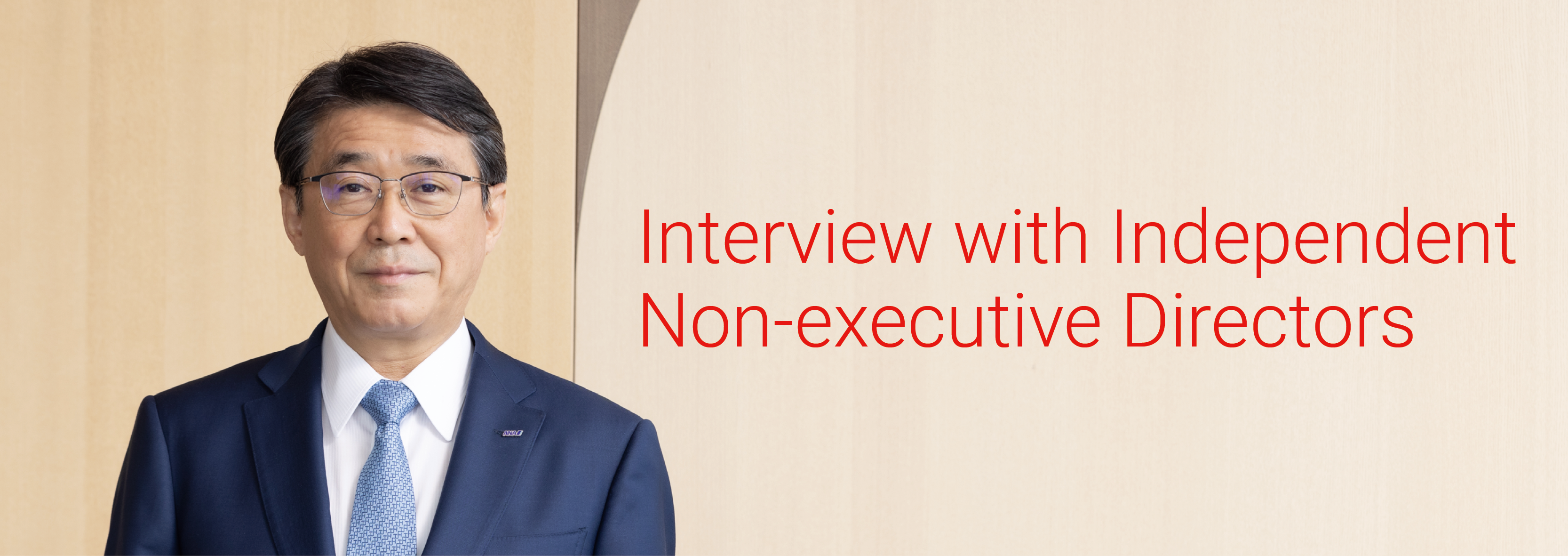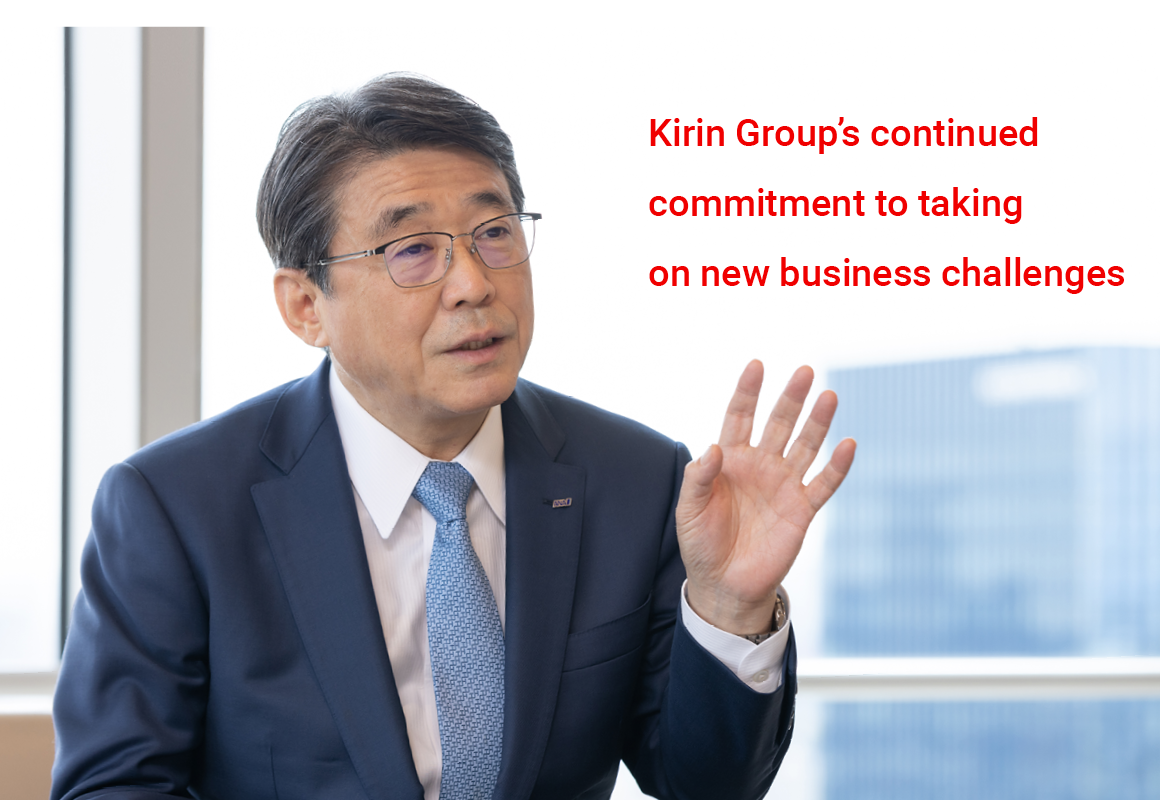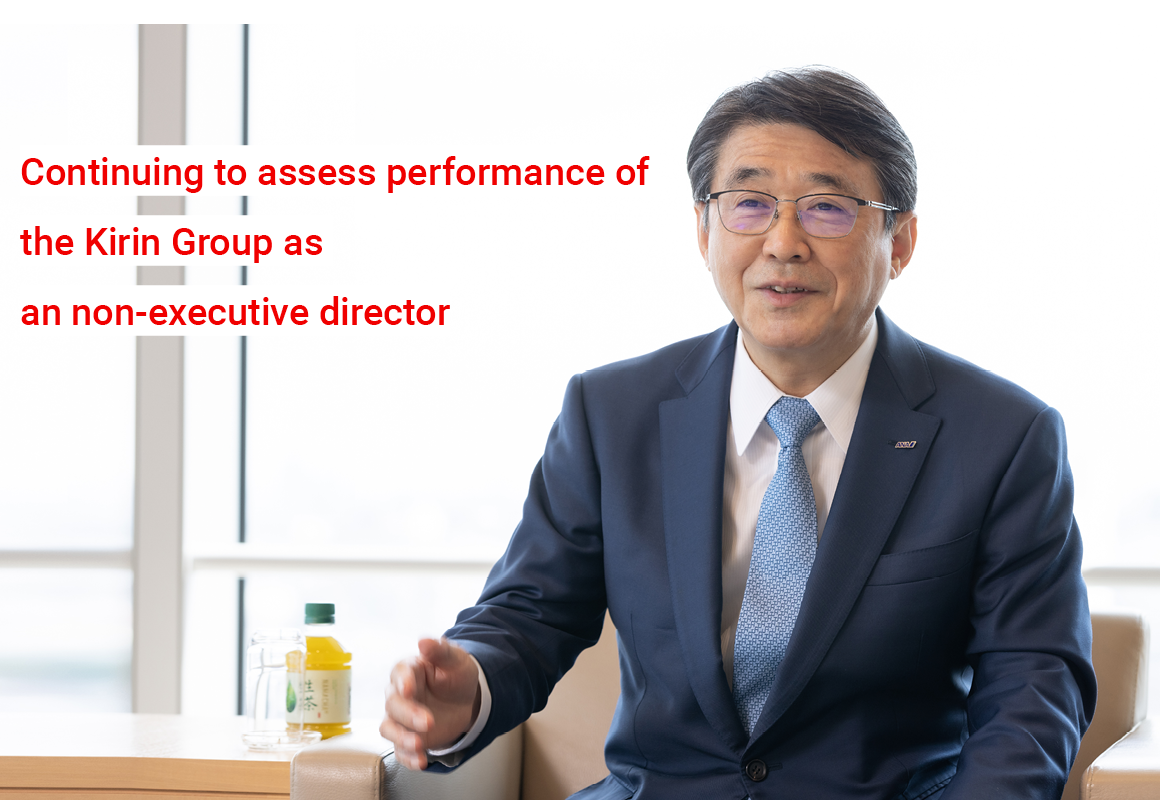Interview with Independent Non-executive Directors
May 31, 2024
Providing a Unique Outside Perspective and
Stimulating Discussion on Achievement of Growth Strategies
Shinya Katanozaka
Independent Non-executive Director of the Board
(Member of the Nomination and Remuneration Advisory Committee)
Member of the board, chairman, ANA Holdings Inc. (current).
Assumed position of director (outside director), Tokio Marine Holdings, Inc., in 2020, and as independent non-executive director of the board (member of the Nomination and Remuneration Advisory Committee) of Kirin Holdings Company, Limited, in 2023.
Assessing the Group’s Entrance Into the New Health Science Business
──One year has passed since you were appointed a non-executive director of the board. How would you assess Kirin’s business portfolio management?
The Kirin Group has built a business portfolio from its existing Alcoholic Beverages, Non-alcoholic Beverages, and Pharmaceuticals businesses and their new Health Science business, with their founding business’ fermentation and biotechnology at its core. If looking at the Food & Beverages, Pharmaceuticals, and Health Science businesses separately, there are corporations with bigger business than the Kirin Group, but there is no other company centered on the above three at the same time. I believe this is what makes the Group’s business portfolio incredibly unique.
Currently, the Kirin Group is stepping up investment in its new Health Science business, but as of the end of FY2023, the Health Science business has not produced clear results, and Kyowa Hakko Bio has posted impairment losses for two consecutive years, which has raised harsh comments from shareholders and others in capital markets. It is true that the monetization of the Health Science business—labeled a driver of medium- to long-term growth—is delayed, so it is not surprising that we are hearing stark criticism from all our investors. Thus, the Board of Directors is focusing on the progress of the Health Science business and its future growth strategies, taking up a large portion of our discussions. We especially spent time on the topic in FY2023 due to the acquisition of Blackmores Limited.
I believe that in the age of VUCA (volatility, uncertainty, complexity, and ambiguity), it is difficult for a company to grow further if it only stays in its existing businesses, and in some cases, it may even decline. Hence, I have no qualms about the Kirin Group's policy of entering and investing in new Health Science businesses. However, it takes time for new initiatives to produce results, and until then, I think it is natural that stakeholders may not be all in favor of the Health Science business.
Looking back on my own experience, ANA Holdings Inc., at which I am chairman of the board, experienced a similar situation when they started scheduling regular international flights as a new business 38 years ago. At the time, ANA Holdings boasted the largest share of the existing domestic flight business at 50%. However, in the international flight business, there was already a leading company with a monopoly on the business, and due to ANA Holdings’ status as a latecomer, awareness of the company’s name continued to be low overseas. For this reason, the belief that it was unnecessary to attempt new business with such risks was the trend for a while, and many people, both outside and inside the company, argued that ANA Holdings should withdraw from the international flight business.
Despite this past, however, ANA Holdings' absolute position in the domestic flight business was shaken 16 years later when the second and third largest competitors increased their domestic flight market share significantly through mergers and the wave of new airline companies entered the market.
Under such circumstances, the international flight business was now what was supporting ANA Holdings’ management. In addition to being highly praised for their courteous, Japanese-style hospitality services, the company’s awareness grew through tie-ups, such as Pokémon Air Adventures. Inbound demand has also become favorable, and non-Japanese shares have grown from approximately 30% to more than 50%, indicating the company’s recognition as a global airline company both by Japan and overseas. However, when the COVID-19 virus spread in 2020, ANA Holdings faced severe financial difficulties as the movement of people on both domestic and international flights came to a halt.
However, there is no telling how long these circumstances will continue. It is for this reason that, in addition to their existing airline and cargo businesses, ANA Holdings will continue to take on new challenges to drive continued growth. These challenges include ANA Avatar, which will be used in transportation as a measure to help reduce CO2 emissions, development of a flying car to achieve emission-free urban air transportation, and other efforts.
This trend is common with that of the Kirin Group. The Pharmaceuticals business that has now cemented its position as a pillar within the Group was launched in 1982, and it took time to embrace the introduction of fermentation and biotechnology into pharmaceuticals. But, looking back at it now, it can be said that top management’s decision at the time was the correct one.
Based on this history, I am sympathetic to the Kirin Group's approach to new businesses with an eye to the future. I am also confident that, in the near future, a time will come when stakeholders will agree with the Kirin Group’s decision to enter the Health Science business.
Sufficient information is provided during the board’s deliberations
──How do you feel about participating in Kirin’s Board of Directors?
The Kirin Group's Board of Directors is unique in that it is chaired by a non-executive director. While there are companies in Japan where a non-executive director chairs the board, the Kirin Group's system is new to me because ANA Holdings, for which I serve as chairman of the board, and Tokio Marine Holdings, for which I serve as outside director, are chaired by internal directors. Thus, I find the structure of the Kirin Group’s board to be refreshing. If the chairperson comes from within the company, it is easy to positively approach the implementation and achievement of the agenda due to having desires similar to those of the executives. On the other hand, non-executive directors of the board can calmly approach them from a non-biased position.
Another feature of the Kirin Group’s Board of Directors is that, generally, directors in charge directly respond to questions received from non-executive directors. I was also surprised that the CEO does not speak more than is necessary. I understand that this is so that he does not guide the direction of discussions. Of course, the CEO clearly states his views on important issues and questions that should be answered by top management. Because we are able to openly exchange opinions, regardless of being from within or outside the company, I do not see any major shortcomings in the current Board of Directors’ method of discussion.
This issue has already been resolved, but until last fiscal year, the Kirin Group did not record comments made during opinion exchanges, information sharing, or other discussions held outside of board meetings on topics outside of issues to be resolved and reported in the minutes in order to encourage free speech. However, all non-executive directors of the board, including myself, are freely sharing our honest opinions, and I felt that they should be recorded. This is because it is better for the Board of Directors to be more transparent and to make the discussions had and decisions made more accessible. Furthermore, by leaving minutes, people are more likely to speak with a greater sense of responsibility.
Other non-executive directors of the board were of the same opinion, and, from this April, we held discussions with the board about some matters of opinion exchanges and decided to record minutes. I am encouraged by the Kirin Group's ability to act quickly.
──Is sufficient information being shared with non-executive directors?
At the Kirin Group, an agenda and documents for board meetings are distributed about a week in advance. Along with these documents, I was very surprised to see videos of each executive, each leader, and others explaining the agenda items. It is a great system in which the people in charge can explain the topics in their own words, clearly communicating their passion.
As opportunities to engage with Group members, I also participated in Group President Meetings, which are attended by top leaders of each Group company, and observed factories/breweries, offices, research centers, and other Group company facilities. During these observations, I had opportunities to socialize with Group members, such as by listening to presentations on projects being implemented by employees at each location and more. Additionally, my visits to multiple retailers to observe actual product sales, sales space creation, and more were great opportunities.
Through such initiatives, I am able to gain a deeper understanding of the agenda. I am also very impressed with the sufficient sharing of information with non-executive directors. Rather, the amount of information and documents provided is about double or triple that of other companies. It’s almost too much (laughs).
To raise the level of information provision to another level, we believe that it would be effective to provide additional information on the status of opinions in favor of or against proposals made at meetings held within each Group company prior to their submission to the Board of Directors. Say that a proposal was unanimously agreed upon at a Group company meeting—this would point to the high possibility that the proposal is one that should be implemented by the Kirin Group. Therefore, we must be more careful in determining whether the decision to implement the proposal deviates from the opinions of society and shareholders. Knowing how decisions were made during company discussions and why people in the company were against agenda items would help to deepen discussions with the board, so I want this information to be shared in addition.
New structure expresses seriousness in achieving KV2027
──How do you rate Kirin’s governance structure?
It is generally accepted that Japan began governance efforts after the first corporate governance code was enacted in 2015. The Kirin Group has been strengthening governance efforts since more than 10 years prior to that, and I think that is wonderful.
Furthermore, in addition to the chairperson of the board being an independent non-executive director, I am impressed by the directors’ wide variety of skills and that many of the auditors are experts in their field. The Pharmaceuticals and Health Science domains are highly specialized areas, and I often find governance in these areas to be difficult because they are far outside my field. However, I am encouraged by the fact that there are members of the board, including non-executive directors of the board, that are experts in these fields.
In addition to the above, the discussions are based on the opinions of investors, which is why we are convinced that Mr. Masakatsu Mori, independent non-executive director (chairman of the Board of Directors* at the time) and Ms. Noriko Shiono, independent non-executive director (member of the Nomination and Remuneration Advisory Committee), are correct in stating in the FY2023 Integrated Report 2023 that “Kirin Group’s corporate governance initiatives are world class.”
Takeshi Minakata was appointed as the new p resident & COO in FY2024. In the Integrated Report 2023, Mr. Minakata shared his vision for the business from his standpoint as the then-officer in charge of health science strategy, in addition he is also the director in charge of Blackmores. The fact that the officer in charge of the Health Science domain—which is a new area of focus for the Kirin Group—was appointed as the new president shows the Group’s seriousness about growing the Health Science domain while strengthening the existing business.
The new president was selected by the board after sufficient discussion on a succession plan and receiving a report from the Nomination and Remuneration Advisory Committee. The Board of Directors also has appointment and supervision responsibilities and will continue to supervise and oversee thoroughly.
As CEO and representative director of the board, Mr. Yoshinori Isozaki will be responsible for developing a long-term vision and strategy for KV2027 and beyond, driving the growth of the organization, and strengthening relationships with non-executive stakeholders. I will keep a close eye on whether the CEO and COO can work together to quickly produce results.
This fiscal year, I will continue to fulfill my duties as a non-executive director of the board and will leverage my personal experiences and views to evaluate the business portfolio resource allocation and CSV commitment targets and performance that form the base of Kirin’s management.


